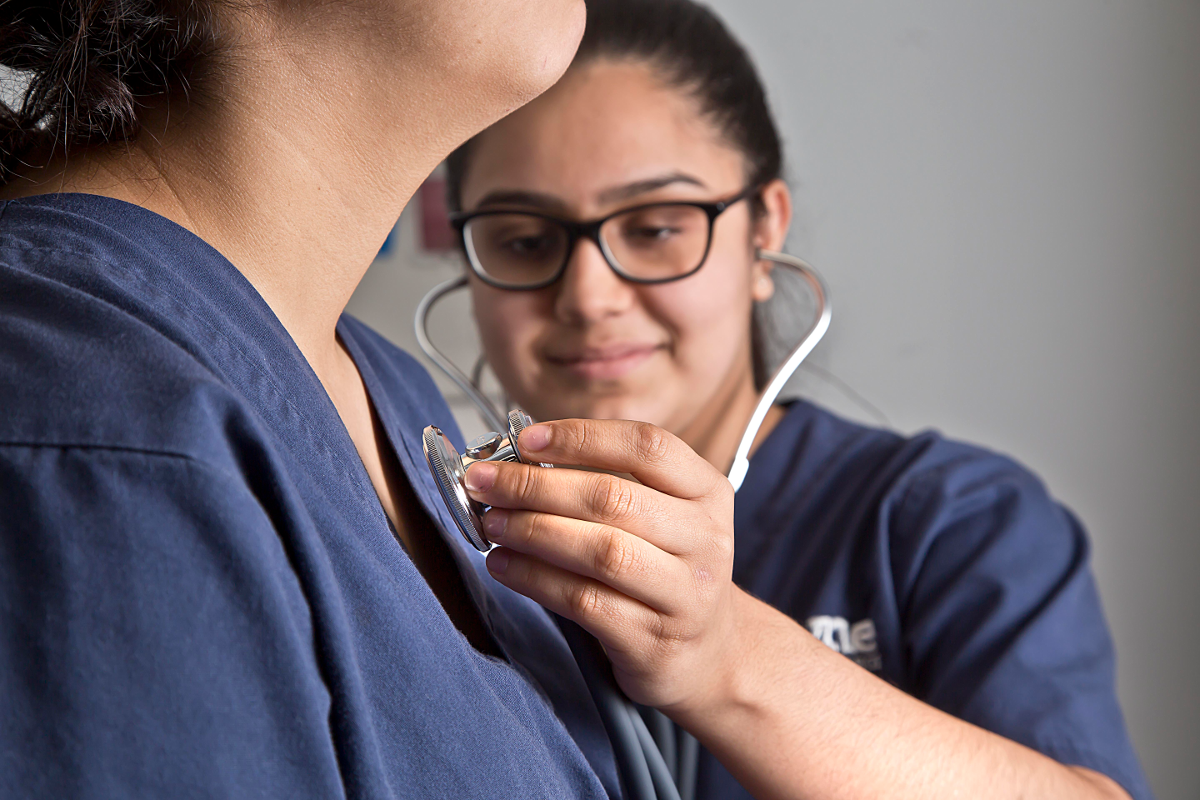Healthcare is a rapidly growing field because the U.S. population is getting older and as people age, they require more medical care. That means jobs are in high demand. According to O*NET OnLine, the projected job growth for medical assistants in the U.S. between 2018-2028 is 23 percent, which is faster than average for other jobs. A medical assisting career could launch you into the healthcare field, giving you what you need for an exciting future.
Why is a medical assistant career such a great choice?
It’s so versatile. Part, A medical assistant is a jack of all trades—part clinician, part administrative assistant, part counselor, and part comforter—who helps doctors in private practice, hospitals, outpatient clinics, and more. Medical assistants are filling expanded and enhanced roles as healthcare follows the trend toward a more team-based approach to patient care.
A medical assistant can be a lifesaver to a physician, who needs to focus on diagnoses and treatment. A medical assistant can help by performing several clinical and administrative duties, including administering medications, checking vital signs, drawing blood, removing sutures, noting patient medical histories, processing insurance claims, and more.
What’s the work environment like?
You’ll never be bored when you follow a medical assisting career path because your responsibilities are so diverse. You can choose the hectic pace of a hospital’s surgical ward or trauma center or slow it down in a private physician’s practice. If you choose the latter, you may have an expanded duty list that is as much administrative as it is clinical or patient-facing.
Where can medical assistants work?
As a medical assistant, you can work in a variety of locations besides hospitals, clinics, and doctors’ offices:
- Retirement facility
The baby boomers are retiring in droves, and many are moving to nursing homes or assisted living facilities. They’re not necessarily ill, but they are elderly and need assistance. Medical assistants can help administer their medication, check their vitals, help with daily hygiene, handle basic physiotherapy and help them get around. - Palliative care facility
Palliative care facilities help cancer patients relieve the symptoms that come with chemotherapy and radiation, giving them a chance to have a better quality of life. A medical assistant can help patients with their daily care, administer medication, change dressings, and lend support to them and their families. - Home healthcare
If you’re looking for flexibility in your career, choosing to work in home healthcare may be ideal for you. Many people who need regular health monitoring choose to stay in their homes rather in a nursing home or rehabilitation facility. They may also need post-hospitalization follow-up care. A medical assistant can fulfill those needs by providing care in the patient’s home. - Military and government Veteran’s hospitals, military bases, rehab facilities, the battlefield, and the U.S. Department of Veterans Affairs all need medical assistants to help teams of healthcare professionals. If you work for a specific branch of the military, you may be expected to complete basic training that is expected of all military personnel, along with additional training.
- Insurance companies
For careers in MA that are not as patient-centric, you may prefer to work for an insurance company. You will use more of the administrative skills you’ve learned, but you’ll also know medical terminology and basic medical care. You would be a valuable resource to an insurance company because you would understand patient medical records and be adept at organizing hospital admissions, lab services, and insurance claims. - Psychiatric or behavioral health facilities
You could help patients recovering from addiction or substance abuse or assist with treatment planning, patient assessment, counseling, or family and patient education.
Because of the pandemic, is now the best time to train?
COVID-19 has brought unprecedented changes to us all, and medical assistant roles during COVID are expanding because of their versatile skillsets. Medical assistants can help combat COVID by supporting frontline doctors, nurses, and other healthcare workers. They may help with COVID-19 testing, taking swabs of symptomatic people. They might be needed to document testing; lift, position, and push patients on stretchers; monitor patient status; or perform CPR. In some states, medical assistants are helping in daycare facilities, watching the children of frontline personnel. They might also help in food services or housekeeping to help out in an all-hands-on-deck situation.
What if I don’t know what type of healthcare career I want?
Medical assisting can be a great springboard for other medical careers. Training is so broad that you get a foundation in all types of things, such as:
- Medical terminology
- Anatomy and physiology
- Pharmacology
- Basic insurance and billing
- Clinical, lab and administrative procedures
- Front-office practices, including coding and billing procedures
- Patient relations and essential workplace skills
- Medical law and ethics
- Technology in the medical office
You could go on to any number of healthcare careers, including nursing, pharmacology, medical billing and coding, human resources, accounting, or electronic health records (EHR).
Where can I get in Chicago?
Enroll in the Coyne College medical assistant program. In Coyne’s 10-month diploma program, you’ll have comprehensive training that covers clinic, laboratory, and administrative procedures, preparing you for an entry-level position as a medical assistant. Additionally, you’ll participate in an MA externship that gives you a chance to practice your newly learned skills in an actual medical facility, working with real patients.
At Coyne College, you’ll get hands-on learning from instructors who are all industry professionals, financial aid for those who qualify, career services, and job placement assistance.
Contact Coyne College today and train to become a medical assistant. Classes begin September 28, 2020!



